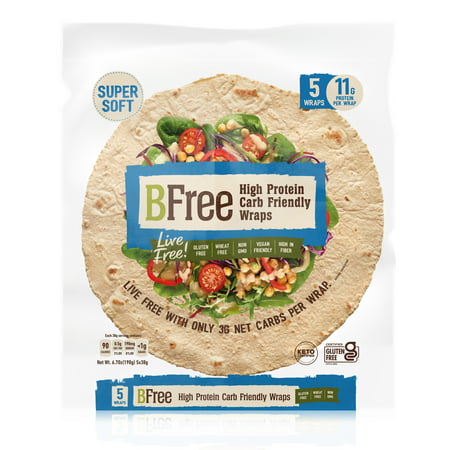Is BFree High Protein Carb Friendly Wraps Vegetarian?

Description
Mild-flavored, soft and pliable flatbreads with a slightly chewy mouthfeel and subtle grainy texture; commonly used to assemble sandwiches, wraps, quesadillas, and roll-ups. Shoppers report reliable flexibility when warmed, occasional tearing when overfilled, and a neutral taste that pairs well with savory or sweet fillings and straightforward storage at home.

Description
Mild-flavored, soft and pliable flatbreads with a slightly chewy mouthfeel and subtle grainy texture; commonly used to assemble sandwiches, wraps, quesadillas, and roll-ups. Shoppers report reliable flexibility when warmed, occasional tearing when overfilled, and a neutral taste that pairs well with savory or sweet fillings and straightforward storage at home.
Ingredients
Water, Rice Protein, Pea Protein, Garbanzo Bean Flour, Bamboo Fiber, Sunflower Oil, Xanthan Gum, Pear Juice Concentrate, Inulin, Golden Milled Flaxseed, Guar Gum, Sourdough (Fermented from Corn Starch and Rice Flour), Cultured Dextrose, Rowanberry Extract, Mono & Diglycerides, Salt, Citric Acid (A Natural Mold Inhibitor), Psyllium Husk, Malic Acid (A Natural Mold Inhibitor), Tartaric Acid (A Natural Mold Inhibitor), Natural Flavoring, Glucono Delta Lactone.
What is a Vegetarian diet?
A vegetarian diet eliminates meat, poultry, and fish but typically includes dairy, eggs, and plant-based foods. People adopt it for ethical, environmental, or health reasons. This diet emphasizes fruits, vegetables, legumes, grains, nuts, and seeds as key nutrient sources. Vegetarians often get protein from eggs, tofu, beans, and lentils. It can offer health benefits such as reduced risk of heart disease and improved weight management, though attention should be given to nutrients like iron, zinc, and vitamin B12. With proper planning, a vegetarian diet can be both nutritionally complete and sustainable.
Similar Products
Rao's Homemade Marinara Sauce Premium Quality All Natural Tomato Sauce & Pasta Sauce Keto Friendly & Carb Conscious - 24oz
Rao's Homemade Tomato Basil Pasta Sauce Premium Quality All Natural Tomato Sauce & Pasta Sauce Keto Friendly & Carb Conscious - 24oz
fairlife Core Power High Protein Milk Shake Chocolate - 14 Fl. Oz.
Ole Xtreme Wellness! High Fiber, 8 Flour Tortillas, Carb Lean, Keto Friendly
Banza Chickpea Penne Pasta: High Protein & Lower Carb (6-pack) (Penne)


